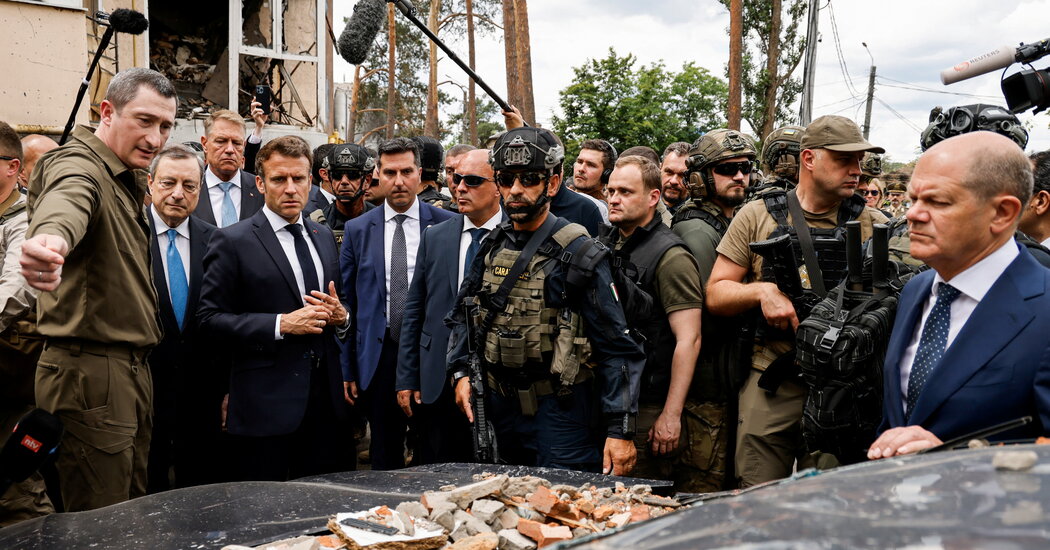
LYSYCHANSK, Ukraine — All of the bridges connecting the twin Ukrainian cities of Lysychansk and Sievierodonetsk are destroyed and street-by-street fighting is raging, leaving thousands of civilians largely trapped inside one of the deadliest battles of the war so far.
Russia has targeted the area since its full-scale invasion began in February, but as it has narrowed its offensive to the resource-rich eastern Donbas region, Russian commanders have steadily redirected more forces to the small pocket of land in and around Sievierodonetsk.
There are an estimated 10,000 people still in the city of Sievierodonetsk, with several hundred believed to be holed up in bunkers beneath a chemical plant that is under near constant bombardment. The Ukrainian government said this week that any large-scale evacuation of the city is now impossible. Russia has promised to create a humanitarian corridor, but previous claims have failed to materialize and Russian forces have directed their fire in locations where civilians were gathering to flee.
Fierce fighting continued on Thursday in Lysychansk and Sievierodonetsk. A Russian airstrike struck the center of Lysychansk on Thursday morning, killing at least one person, local authorities said.
Throughout most of the day, Russian and Ukrainian artillery fired from opposing banks of the Siversky Donets River, which divides the two towns. A group of Ukrainian soldiers, taking a breather from the fighting in the basement in a Soviet-style apartment, asked reporters from The New York Times when Western rocket artillery systems would arrive, and said they needed many of them.
On the front line as Russian artillery pounds the city of Lysychansk, “one hour feels like an entire day,” one soldier said.
In Sievierodonetsk, the people in the ruined city are now largely on their own. Those who have made it out recently describe harrowing scenes.
Serhiy Haidai, the head of the Luhansk military administration, said that the shelling was now so intense that “people can no longer stand it in the shelters — their psychological state is on the edge.”
Russia does not control the city, he said, and pitched battles are being fought from house to house. At the same time, Russian forces continue to lay waste to the villages around the city, Mr. Haidai said.
“The destruction of the residential sector is catastrophic,” he said. People in the city have reported running out of food and clean water — describing scenes similar to those that played out in Mariupol and many other towns and cities along the eastern front over the past four months.
Another 60,000 civilians are still believed to be living in Ukrainian-controlled Lysychansk. But the constant Russian bombardment of the area as Russia tries to encircle Ukrainian forces there has made any large-scale evacuation an exceedingly tough proposition.
Much of the estimated 50,000 to 60,000 rounds of artillery Russia is unleashing every day is concentrated in this last sliver of Luhansk Province under Ukrainian control.
The kind of convoy needed for a large-scale evacuation would most likely require coordination between Russia and Ukraine overseen by international mediators. There has been no public suggestion that such a plan is being discussed. In Lysychansk, volunteers, in a medley of vehicles, are evacuating dozens of civilians each day.
Ukraine’s top military commander, Valerii Zaluzhnyi, said in a statement that Russia had focused its efforts on this battle. In addition to nonstop artillery barrages, he said, Moscow is directing airstrikes and using multiple rocket launch systems to obliterate everything in its path. Russian forces are trying to advance along nine separate fronts from the north, east and south.
Despite Russia’s superior arsenal, the Ukrainians have been able to keep Moscow’s forces from completing the encirclement of the area. General Zaluzhnyi said they would continue to fight.
Sievierodonetsk, he said, is a key point in the defensive system of the Luhansk region. “The city can be seen as nothing less than that,” he said.




